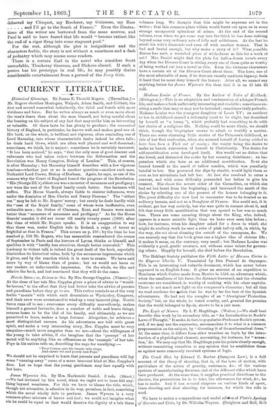CURRENT LITERATURE.
Historical Gleanings. By James E. Thorold Rogers. (Macmillan.)— Mr. Rogers sketches Montague, Walpole, Adam Smith, and Cobbett, the first and second somewhat indistinctly, the third and fourth with moro 'vividness and force. But he writes always as much or even more about the man's times than about the man himself, not being careful about the bearing on his subject of any fact that may strike him as interesting or valuable. Of these facts he has plenty to produce ; the economical history of England, in particular, he knows well, and makes good use of. His book, on the whole, is brilliant and vigorous, often reminding one of Lord Macaulay, into whose characteristic faults indeed he often falls; he deals hard blows, which are often well planted and well deserved ; sometimes, we think, he is unjust ; sometimes he is certainly incorrect. "It has been noticed," he says, "that the only man of good descent and substance who had taken orders between the Reformation and the Revolution was Henry Compton, Bishop of London." This, of course, is after Macaulay ; but Macaulay himself describes with a few vigorous touches—whether just or no is another question—another such man, Nathaniel Lord Crewe, Bishop of Durham. Again, he says, as one of the reasons why the Court of England feared the progress of the Revolution. "His (George IlL's) eldest son was a monster of meanness and profligacy; nor were the rest of the Royal family much better. One instance will suffice. The Horse Guards, always liable to sinister influences, were under the dominion of Mrs. Clarke and Nancy Parsons." The "eldest son" may be left to Mr. Rogers' mercy ; but surely he deals hardly with the "rest of the Royal family," some of whom were inoffensive, even estimable men ; the Dukes of Clarence, Kent, and Sussex were much better than "monsters of meanness and profligacy." As for the Horse Guards' scandal, it did not occur till nearly twenty years (1809) after the time of which Mr. Rogers speaks. It is an exaggeration to say that there was, under English rule in Ireland, a reign of terror as frightful as that in France." This occurs on p. 105; by the time he has reached p. 156 Mr. Rogers, who has meanwhile remembered the scenes of September in Paris and the horrors of Lyons, thinks so himself, and qualifies it with "hardly less atrocious, though better concealed." This tendency to violent talk is indeed the great fault of the book, especially diminishes its historical value, both by the erroneous impressions which it gives, and by the reaction which it is sure to create. We have said more by way of blame than of praise ; but we would not leave on our readers an unfavourable impression. On the whole, we like and admire the book, and feel convinced that they will do the same.






























 Previous page
Previous page